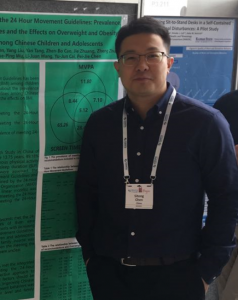Please tell us about your career pathway to date (positions and institutes).
I am currently a Ph.D. student at Victoria University (Melbourne), Institute for Health and Sport (iHeS), also working as a research assistant with two academic institutes in China. Before that, I gained my Bachelor’s and Master’s degree in Physical/Sport Education, and Physical Activity Promotion.
What is your main research interest?
In general, I am interested in research on movement behaviors (physical activity, sedentary behavior, sleep) and motor development in children and adolescents. Also, I have experience and knowledge in physical education and physical literacy. Of these research interests, I mainly study how to improve healthy movement behaviors, using a behavioral epidemiological perspective.
How do you explain your current research/job to friends and family?
My work mainly involves researching how to “move more, sit less and sleep well” for populations aged under 18 years. For this population group, doing more physical activity, limiting sedentary behavior and having optimal sleep habits are of great health benefits. So, I am exploring the associations between physical activity, sedentary behavior and sleep with various health outcomes. In addition, I am engaging in surveillance and monitoring of movement behaviors at the population level. This work will help to inform policymakers how to design and implement effective action plans.
What are the main barriers you encounter/experience when conducting research, or what information/skills do you lack to conduct high quality research?
For me, English and statistical foundations are two main barriers in my research work. It is somewhat more difficult for each non-English speaker (like me) to do quality research, where English is the only language in the current research field. It is therefore necessary for me to strengthen my English communication skills. The other barrier is advanced statistical knowledge. Doing quantitative research requires a deeper understanding of how to use statistical knowledge properly. However, learning advanced statistical knowledge is a challenging and complicated thing (boring). Fortunately, I have many nice colleagues who are good at writing in English and illustrating statistical knowledge. When I am facing barriers in writing and statistical issues, I always attain assistance from my colleagues worldwide.
What could help you as a student/ECR to further develop/grow in your current position?
Different researchers may have varied answers. At least for me, communicating with leading experts with different backgrounds and receiving their guidance are critical. As young researchers, we lack experience in doing high-quality research, like designing research projects, replying to peer-reviewers and interpreting data. Absorbing distinct perspectives helps us upgrade our research knowledge and evidence.
What do you think will be the next most important development in the nutrition and/or physical activity field?
Insightful! The next most important development in my own research is to do more longitudinal and intervention studies to explore and confirm the causal relationship between movement behaviors and health outcomes, though being costly and time-consuming. In our research field, many studies have inherent limitations owing to study design, which inhibits researcher understanding. This also hampers advancing the research field. We, young researchers, should make full efforts to solve it and undertake the responsibility to make research evidence stronger.
Given unlimited funding, what would your dream research project be?
My dream research is to conduct a global-scale intervention aiming at improving physical activity level in children and adolescents, just imagine.
What’s something you have learnt about your research or yourself that was unexpected?
As a young physical activity researcher, we should adhere to healthy movement behaviors and then move our work forward better!
If you’d like to get in touch with Si-Tong, you can do so via email [email protected] or Twitter @chenst1212


